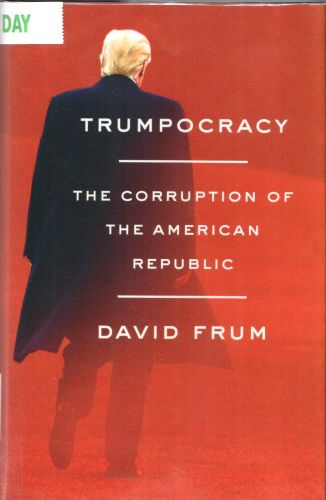

| TRUMPOCRACY The Corruption of the American Republic David Frum New York: HarperCollins, January 2018 |
Rating: 5.0 High |
|||
| ISBN-13 978-0-06-279673-8 | ||||
| ISBN 0-06-279673-9 | 300pp. | HC | $25.99 | |
David Frum is a senior editor at The Atlantic and the author of ten books. He was previously a speechwriter for George W. Bush and considers himself a conservative Republican although he voted for Hillary Clinton in 2016.
In Trumpocracy, he describes the multifarious unfitness of Donald Trump for the presidency and the persistent refusal of Republicans in Congress to restrain his dangerous tendencies. These enablers, Frum reveals, face the very real threat of alienating their base of support: voters who in the wake of the Great Recession of 2008 feel economically abandoned and culturally disrespected by the political establishment. In the chapter called "Resentments," he quotes a writer of a prominent blog1 who offers this justification:
"A few dopey intellectuals and their absurd little notions can have outsized power: the power of the echo chamber, the power of fashionable acceptance, the power of creating the atmosphere within the Beltway Bubble. And while Republicans frequently strut and fret about their opposition to leftist malarkey, they just as frequently acquiesce to it in the event . . . Trump [is] deaf to the echo chamber, indifferent to media acceptance, immune to the atmosphere. In fact, some of the very things that make Trump unappealing to gentle folk like me—his belligerence, his recklessness, his bullish and even bullying insistence on his own vision—are also what sometimes lift him above the Leftist Crazy." – Pages 194-195 |
There is ample justification for these feelings of resentment: the disappearing jobs (and the health insurance that went with them); the inability to find adequate, affordable insurance on the private market; the perceived condescension of the media both traditional and digital for many in "flyover country." But while economic distress is real enough, for many, these blows are more imagined that real. It leads to a feeling of victimhood, as in the writer quoted above, and a tendency to grasp at illusory solutions. An example from the 2016 campaign is Hillary Clinton's performance in West Virginia. One clumsy remark about taking coal jobs away doomed her; she made personal appearances to apologize for a remark (taken out of context) and explain her $30 billion plan to retrain displaced miners, provide health care and education for their families, bring new jobs into the area... It was not enough. Donald Trump carried the state with his facile promise to bring back coal jobs — a promise that could never be kept.
And even if Trump had offered a feasible plan to help West Virginia, his other deficits would have outweighed it. I won't run through the list again; suffice it to say that anyone who voted for Trump voted to severely handicap America.
"Trump gained the presidency thanks in great part to voters disgusted by a status quo that was ceasing to work for more and more of them. The largest and most loyal subset of those voters were men who felt devalued in the economy and disrespected in the culture, who chafed at being scolded for their 'privilege' even as they succumbed to disability, drugs, and early death. Trump has not kept faith with those voters. But they have kept faith with him. For fear of them, Trump's party stays bolted to him. Members of his party may denounce him in 'on background' interviews. His own staff will leak their disgust at his antics and cruelties. Yet whatever these powerful people say in private, they continue to enable him in public. It is their public actions, despite their private qualms, that sustain Trumpocracy." – Page xv |
David Frum understands Trump's deficits very well, and explains them thoroughly. His book is a useful complement to those by Luke Harding, who focuses mainly on the Russian connections, and by David Cay Johnson, who concentrates on Trump's business and tax policies and the people he chose for his cabinet. Frum emphasizes the political process, reporting what Trump has said and how people responded to his remarks. It is a somewhat depressing account, revealing (as does Johnston) that Trump is all for himself and, though he has no understanding of government or policy, instinctively grasps how to manipulate his audience. But the book is very much worth reading. It is well documented in endnotes and has an excellent index. I give it top marks and rate it a keeper.
And with all his dire warnings, Frum ends the book on a hopeful note:
"Those citizens who fantasize about defying tyranny from within fortified compounds have never understood how liberty is actually threatened in a modern bureaucratic state: not by diktat and violence, but by the slow, demoralizing process of corruption and deceit. And the way that liberty must be defended is not with amateur firearms, but with an unwearying insistence on the honesty, integrity, and professionalism of American institutions and those who lead them. We are living through the most dangerous challenge to the free government of the United States that anyone alive has encountered. What happens next is up to you. Don't be afraid. This moment of danger can also be your finest hour as a citizen and an American.". – Page 235 |

 To contact Chris Winter, send email to this address.
To contact Chris Winter, send email to this address.